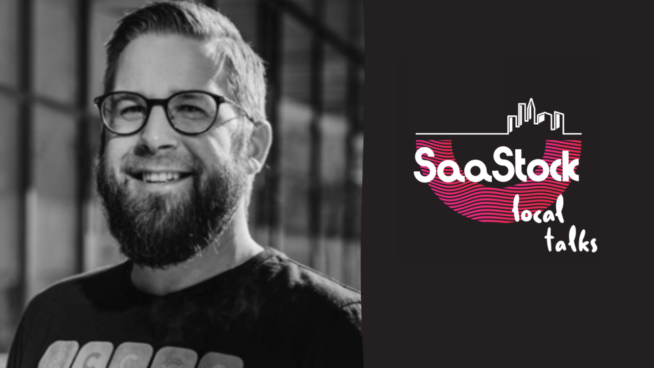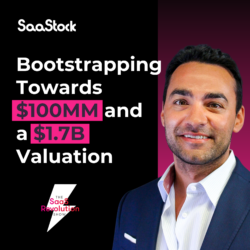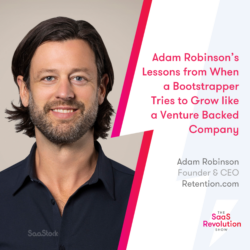SaaStock Local Talks are interviews we at Brainy Bees carry out with people who live and breathe SaaS.
Over these virtual coffees, we’ll discuss everything SaaS related.
The fifth interview features Viktor Vanek, co-founder of CloudTalk.
You are Viktor Vanek and you are…
the co-founder of CloudTalk — the modern cloud-based phone suite for smart sales and support teams. I’m also a traveler, coffee lover, outdoorsman and mountain biking fanatic.
How did your journey with CloudTalk begin? How did you get to where you are today?
First, we need to move back in time to more than 12 years ago, when I met Martin — the other CloudTalk co-founder — while working side-by-side on IT projects at a digital marketing agency.
A few years later, client projects started to bore us, and CloudTalk was born. It started as a simple click-to-call solution. The idea was that companies could embed our click-to-call button into their website, enabling their visitors to call them directly from their browser anywhere in the world for free.
Soon after, we realized there was huge potential to build something with more impact, something more complex and connected to other business tools that companies use on a daily basis. So, we built the CloudTalk we know today.
We now have over 75 amazing teammates of 16 different nationalities, working remotely from 10 different countries on three continents or from our two beautiful offices, with thousands of customers all over the world and millions of calls made via CloudTalk every single week.
What is CloudTalk? What makes it stand out from the crowd?
CloudTalk is a cloud-based call center solution for smart sales and support teams. We’re building a modern phone suite for mid-market users that helps salespeople crush quota and decrease the first resolution time for support teams. It has all of the functionalities that a typical landline phone service has along with many cloud computing features.
What are CloudTalk’s plans for 2021?
Our plan for 2021 is quite simple: Triple our headcount and ARR as well as continue building a modern phone suite with a strong focus on the highest call quality, workflow automation and configuration.
Go bootstrapping or go to investors?
Bootstrap first, raise money later. Like we did.
How has the pandemic affected your growth? Did you have to cope with churn, or did you deal with more clients?
Since the pandemic started, we’ve helped hundreds of new customers quickly move from old legacy call center software to CloudTalk, a modern cloud-based phone solution. We’ve seen an increase of leads in industries like e-commerce, government, education and financial services, and the reason to leave their legacy on-premise solutions was, in most cases, almost the same: a strong urgency to move employees from offices to their home environment and start working fully remotely.
Most of our customers have needed a quick, smooth transition to CloudTalk — so the whole team worked under enormous pressure because, suddenly, we found ourselves having to scale our infrastructure more rapidly than ever before while continuing to deliver a great customer experience.
But, thanks to our ability to move fast, our customers were able to discover other benefits of CloudTalk over time — like integrability and automation — which have made their lives much easier.
A part of our approach when the pandemic started was also quickly identifying which of our customers got affected the most. We then offered them a “COVID Discount” because we really do appreciate our customers, and we wanted to remain loyal. Maybe that’s why we did not notice a higher churn.
Of course, we did notice higher contraction in highly pandemic-impacted industries like travel and rental services. But, overall, the added MRR overshadowed the lost one.
When you’re not feeling motivated, how do you motivate yourself?
The first thing to realize in those situations is that it’s completely normal to lose motivation. The second one is that no one can motivate you but yourself. You just need to figure out how to recover from a slump.
I read books by, for example, Mark Manson or Thomas Erikson, I listen to talks by speakers like Eric Thomas, I take time off with my family or, my favorite option, I take my bike to the mountain and have a nice ride.
What do you feel is the biggest strength of the company right now?
The team, definitely. And I mean every single team member because, together, they work like a well-oiled machine. Or maybe it’s the technology we have — but that’s built by our team, so even that is, in fact, the team. 😉
What is something you wish someone had told you during your career journey?
Two things.
The first: You can’t make everyone happy; you’re not pizza.
The second: Do not be scared to fail and ask questions.
What is the best and the worst part of being a founder?
The best: Watching the company grow from scratch.
The worst (or hardest): Prioritizing under stress. Everyone says, “Just pick the most important task,” but it’s not that simple.
What are your greatest professional challenges? How did you overcome them and what have you learned from them?
I’m still learning to not be scared to fail, to ask questions and to be okay with not making everyone happy. 🙂
What would others call your communication style? Are you close to your employees or do you prefer to maintain a healthy distance?
I can only guess, but I do my best to be friendly, honest, fair, informal, respectful and considerate.
If you had to give one business lesson to people who think about launching their SaaS, what would it be?
Stop thinking and start doing (or launching). Hope it speaks for itself.
What other CEOs do you look up to (and I should interview)?
All the CEOs of our competitors… 🙂
______
Thank you, Viktor!





